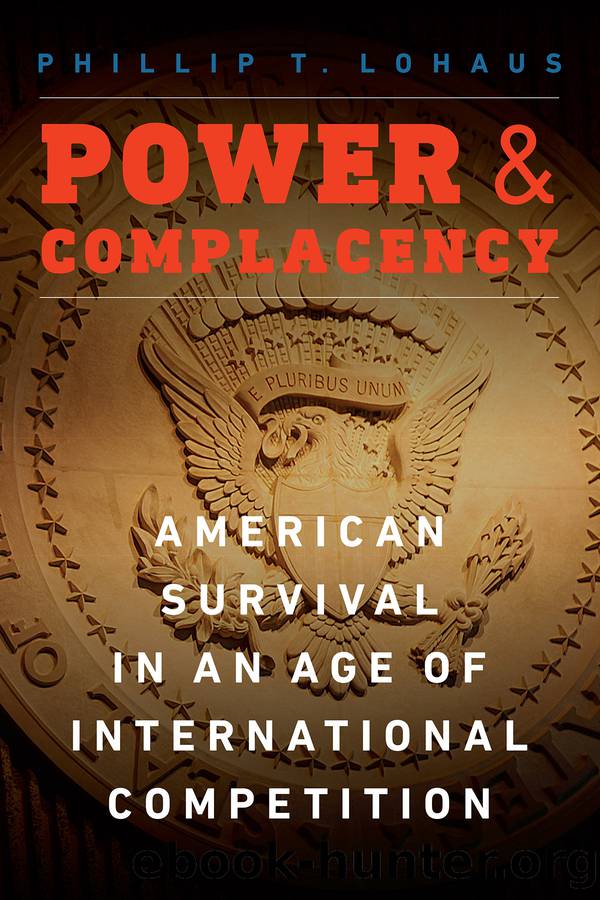Power and Complacency by Phillip T. Lohaus

Author:Phillip T. Lohaus [Lohaus, Phillip T.]
Language: eng
Format: epub
Tags: POL011000 Political Science / International Relations / General, POL062000 Political Science / Geopolitics
Publisher: University of Nebraska Press
Contemporary Short-of-War Competition
There was, of course, one major roadblock to this rosy outcome: the Soviet Union. The United States had much more leverage in negotiating the terms of peace than it had had after the First World War. But the Soviet Union, which bore the brunt of allied losses, also held sway at the negotiating table, both in the absence and in the presence of the United States. In what has become known as the percentages agreement, Churchill and Stalin discussed a scheme, without President Roosevelt, at the Moscow Conference of 1944 to carve the world into separate spheres of influence: one for the victorious democracies and another for the Soviet Union.81 At the other major peace conferences, the demands of democracy undermined Americaâs bargaining position. At Tehran, President Roosevelt recused himself from the question of Polandâs future due to Polish-American interests in his upcoming election, and in preparing for Yalta, American diplomats underscored that Stalin would have the luxury of speaking for himself rather than for the people he represented.82 As in conflicts past, the United States either failed to grasp the consequentiality of the negotiations underway or assumed the possibility if not probability of future cooperation with the Soviet Union. Either way, the Allies had rid the world of fascism, but the brand of authoritarianism espoused by Stalin would remain.
The dangers of this new reality were not entirely evident at warâs end. Between 1945 and 1946, the United States reduced the size of its standing army from over eight million active troops to under two million, even with the forthcoming and foreseeable increase to its peacetime worldwide responsibilities.83 The U.S. government disbanded the Office of War Information within two weeks of peace with Japan. Although President Harry S. Truman became convinced of the need to retain the intelligence analysis and operations capacity established by the OSS during the war, others in the executive branch and in Congress saw little need to maintain this functionality in in the newfound era of peace.84 The advent of the atomic bomb served as a rationale for a drawdown that was in fact quite typical of Americaâs tendency to dismantle military and intelligence functions at the end of a warâand one called for by the American people.85 Having only recently facilitated the founding of the United Nations and the Bretton Woods system of international monetary management, few had the stomach to consider the possibility of future conflict.
Not all believed that the international institutions established at the end of the Second World War would be sufficient to curtail threats to American national security. When the U.S. Department of Treasury inquired of the U.S. Embassy in Moscow in early 1946 why the Soviets seemed uninterested in the newly established mechanisms of international economic governance, Deputy Head of Mission George F. Kennan responded with his Long Telegram. The memorandum detailed the Kremlinâs deeply held sensitivity to âcapitalist encirclement,â and characterized the Soviet psyche as one âhighly sensitive to the logic of forceâ and âimpervious to the logic of reason.
Download
This site does not store any files on its server. We only index and link to content provided by other sites. Please contact the content providers to delete copyright contents if any and email us, we'll remove relevant links or contents immediately.
The Secret History by Donna Tartt(19023)
The Social Justice Warrior Handbook by Lisa De Pasquale(12182)
Thirteen Reasons Why by Jay Asher(8882)
This Is How You Lose Her by Junot Diaz(6869)
Weapons of Math Destruction by Cathy O'Neil(6260)
Zero to One by Peter Thiel(5782)
Beartown by Fredrik Backman(5729)
The Myth of the Strong Leader by Archie Brown(5491)
The Fire Next Time by James Baldwin(5422)
How Democracies Die by Steven Levitsky & Daniel Ziblatt(5209)
Promise Me, Dad by Joe Biden(5139)
Stone's Rules by Roger Stone(5078)
A Higher Loyalty: Truth, Lies, and Leadership by James Comey(4945)
100 Deadly Skills by Clint Emerson(4910)
Rise and Kill First by Ronen Bergman(4772)
Secrecy World by Jake Bernstein(4736)
The David Icke Guide to the Global Conspiracy (and how to end it) by David Icke(4696)
The Farm by Tom Rob Smith(4500)
The Doomsday Machine by Daniel Ellsberg(4480)
